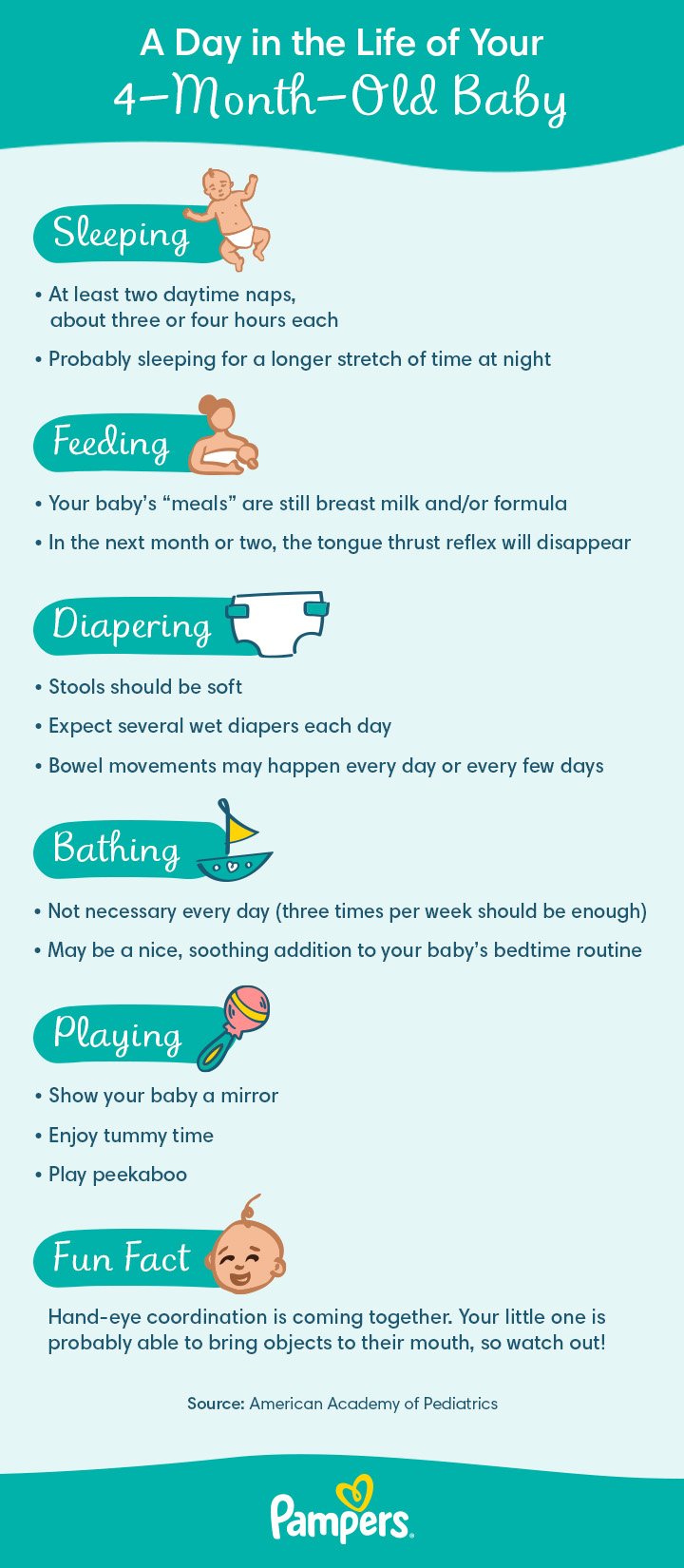
The Marvelous Milestones of a 4-Month-Old Baby: A Comprehensive Guide
The fourth month of a baby’s life marks a period of remarkable growth and development. As your little one transitions from a newborn to an infant, you’ll witness a surge of new abilities and milestones that will fill you with awe and wonder. This comprehensive guide will delve into the physical, cognitive, social, and emotional milestones that typically emerge during this exciting phase.
Physical Development
- Head Control: Your baby’s head control will continue to improve, allowing them to hold their head up for longer periods when lying on their tummy or being held upright.
- Rolling Over: Around 4 months, many babies begin to roll over from their tummy to their back. This newfound mobility allows them to explore their surroundings from a different perspective.
- Grasping and Reaching: Your baby’s grasp reflex will become more intentional, and they’ll start reaching for objects with both hands. They may also be able to hold small objects for a few seconds.
- Sitting Up with Support: With support, your baby may be able to sit up for short periods. They’ll use their arms and legs to balance and may even start to lean forward to reach for toys.
- Weight and Height: By 4 months, your baby’s weight should have doubled since birth, and their height should have increased by about 5 inches.
Cognitive Development
- Object Permanence: Your baby will begin to understand that objects still exist even when they can’t see them. This concept helps them develop memory and problem-solving skills.
- Cause and Effect: Your baby will start to learn about cause and effect relationships. They may enjoy banging on toys to make noise or kicking their legs to create movement.
- Imitation: Your baby may start to imitate your facial expressions and gestures. This is a sign of their growing social and cognitive abilities.
- Stranger Anxiety: Around 4 months, your baby may start to show signs of stranger anxiety. They may become fussy or clingy when they’re around unfamiliar people.
- Memory: Your baby’s memory will continue to develop, and they may be able to recognize familiar faces and objects.
Social and Emotional Development
- Smiling and Laughing: Your baby’s smiles will become more frequent and expressive. They may also start to laugh out loud, especially when they’re playing or interacting with you.
- Social Interaction: Your baby will become more interested in interacting with others. They may enjoy playing peek-a-boo, making eye contact, and babbling.
- Attachment: Your baby’s attachment to you will continue to grow stronger. They may prefer to be held by you and may cry when you leave the room.
- Self-Soothing: Your baby may start to develop self-soothing techniques, such as sucking on their thumb or rocking back and forth.
- Separation Anxiety: Your baby may experience separation anxiety when you leave them with someone else. This is a normal part of their development and usually subsides by 8-12 months.
Communication
- Babble: Your baby’s babbling will become more frequent and varied. They may start to string together different sounds and syllables.
- Cooing: Your baby may continue to coo, which is a soft, gentle sound that expresses contentment.
- Crying: Crying remains your baby’s primary way of communicating their needs. They may cry when they’re hungry, tired, wet, or uncomfortable.
- Gestures: Your baby may start to use gestures to communicate, such as waving their arms or pointing at objects.
Sleep
- Sleep Patterns: Your baby’s sleep patterns may become more regular, and they may start to sleep for longer stretches at night.
- Night Wakings: Most babies still wake up at least once or twice during the night to feed.
- Naps: Your baby may take 2-3 naps per day, each lasting for about 1-2 hours.
Feeding
- Breastfeeding: If you’re breastfeeding, your baby may start to nurse for shorter periods and may become more efficient at latching on.
- Formula Feeding: If you’re formula feeding, your baby may start to drink more formula at each feeding.
- Solid Foods: Your baby is not yet ready for solid foods, but you can start introducing them to a spoon and bowl.
Health and Safety
- Vaccinations: Your baby will receive their 4-month vaccinations, which protect against diphtheria, tetanus, pertussis (whooping cough), Haemophilus influenzae type b (Hib), and polio.
- Tummy Time: Continue to give your baby plenty of tummy time each day to help strengthen their neck and back muscles.
- Car Seat Safety: Always use a rear-facing car seat for your baby until they reach the age of 2 or the weight limit of the seat.
- Bath Time: Bathe your baby 2-3 times per week. Use warm water and a gentle baby soap.
Tips for Parents
- Encourage Play: Engage your baby in interactive play that stimulates their senses and cognitive development.
- Talk to Your Baby: Talk to your baby often, even if they don’t understand what you’re saying. This helps them develop language skills.
- Read to Your Baby: Reading to your baby exposes them to language and helps them develop a love of books.
- Sing to Your Baby: Singing to your baby is a great way to bond and soothe them.
- Be Patient and Supportive: Every baby develops at their own pace. Be patient and supportive of your baby’s progress.
Conclusion
The fourth month of a baby’s life is a time of rapid growth and development. As your little one reaches new milestones, you’ll witness their transformation from a helpless newborn to an inquisitive and interactive infant. By understanding the typical milestones and providing a nurturing and stimulating environment, you can support your baby’s optimal development and create lasting memories during this precious time.
